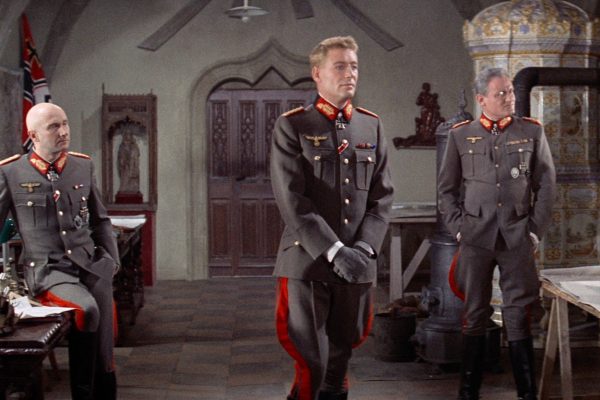On Blu-ray from Mon 13 May 2019
In many ways, The Night of the Generals sounds on paper like box office gold. The film adaptation of a bestselling novel, spanning three decades, and as many countries. A reunion of Omar Sharif, and Peter O’Toole, under the guiding auspices of Lawrence of Arabia producer Sam Spiegel. And a tale weaving a complex web of murder, mystery and intrigue against a backdrop of war and conspiracy. Yet it never quite managed to connect with either audiences or critics, and as such has long languished as an also-ran late-night TV film.
All of which is rather a shame, as it’s an incredibly ambitious production, as one might expect from the top-tier talent present. In fact, there’s barely a bum acting or technical note throughout the entire duration. In almost every way it’s a crisp and elegantly shot film with little to hold against it, save for some jarring moments of clumsily over-dubbed dialogue. Another minor issue is the, unfortunately, all too common effect of the new 4K transfer showing up the actors’ make-up very clearly. However, the real stumbling block is in the pacing and complexity of the interwoven multi-layered stories, and some awkwardly unintuitive time and location jumps in the story.
The film begins simply enough, with a Polish man witnessing a murderer leaving a building, but only being able to see that the man wore the uniform of a Wehrmacht General. As the victim was not merely a prostitute but also a German agent, it falls upon Major Grau (Sharif), a single-minded and obsessive intelligence officer, to root out the killer. There are only three suspects: Generals Tanz (O’Toole), Kahlenberge (Donald Pleasence) and von Seidlitz-Gabler (Charles Gray); each is markedly different, and clearly, all have secrets to hide. Meanwhile, a young officer has caught the romantic attentions of one of the Generals’ daughters, and their story becomes inextricably entwined with the various mysteries.
It’s a testament to The Night of the Generals that despite the myriad plotlines, suspects and conspiracies, the plot remains fascinating throughout. This is despite the film leaping forwards twenty years almost at random, and without warning several times. These flash-forwards are never sufficiently explained, and discombobulate where they should intrigue. They do slowly tease out and reduce suspects while throwing in nuggets of information, but their brevity and randomness make them feel like an afterthought. Similarly, the murder mystery plot takes huge precedence only to suddenly drop away for a great block of the run-time while other plots are given the fore. This has the side effect of betraying the clear Film Noir influences at work in the story. Indeed the largest issue is that the film is desperate to crowbar in as much of the July 20th plot into the film as possible. While these aspects are interesting, and some scenes were clearly a major influence on the look of similar moments in the 2008 film Valkyrie, it detracts by taking time away from more pressing character moments in an already cluttered film.
Despite that, it’s still a beautifully shot film, and Pleasence, Sharif, and Gray milk every scene for all it’s worth, as does Philippe Noiret, who appears at the midpoint as the dry-witted French Inspector, and Resistance leader. But one of the great joys of this is seeing O’Toole in particularly understated mode as the PTSD riddled Tanz, alternating between genially offering food to starving children, and coolly ordering the obliteration of large portions of Warsaw. If anything sticks with you from the film, it’ll be his eyes as he stands shivering and sweating, staring in horror at Van Gogh’s “Vincent in Flames”.
